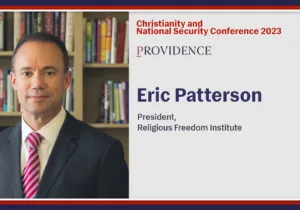Amidst the rise of new nationalist populist movements on the right in Western democracies, a number of Christian conservatives have sought to align themselves with this new nationalism. First Things editor R.R. Reno has gone so far as to argue that there is a “new cold war” between nationalists and those he defines as “globalists.” According to Reno’s schema, “globalists” believe in subordination of national sovereignty to supra-national global organizations and treaties. They are free-traders who support large-scale immigration and multilateralism in foreign policy, and show affinity for organizations like the United Nations and European Union. By contrast, “nationalists” support the preservation of state sovereignty and autonomy, oppose free trade and large-scale immigration, and are skeptical of any permanent international alliances. Reno places himself—and by implication of his arguments, Christianity—on the nationalist side of this “new cold war.”
I think there are factual reasons to be skeptical of the idea of an international conflict over nationalism, from the embrace of protectionism by many “globalists” in France to the embrace of a multilateral critique of US actions in Iraq by the supposed arch-nationalist Vladimir Putin. The issue that drives the rise of nationalist populism, mass-immigration, seems to me more indicative of a new domestic culture war in several nations than a full-on new international cold war.
Notwithstanding this caveat, a question still remains for Christians: how ought we to think of globalism and nationalism? Is there a clear, consistent moral distinction between the two sides, from a Christian perspective? In the old Cold War, most, though not all, Christians firmly rejected any moral equivalence between the United States and the Soviet Union. The USSR, and its allies and ideological fellow travelers in the Marxist-Leninist movement, made little secret of their intent to do away with religion in the fullness of time. At a minimum, Dr. Samuel Johnson’s famous quip about the mental effect of imminent hanging applied. Beyond that, communism murdered hundreds of millions, either by accident or, more often, as state policy. That math wasn’t hard.
On balance, however, the math on globalism-verses-nationalism is a good bit harder. As Yoram Hazony argues in his intriguing new book The Virtue of Nationalism, there is a biblical case to be made for the rise and efficacy of the nation-state in Israel, and its contrast to the wickedness of empires. And yet both Old and New Testaments also speak of a messianic blessing for all nations, fulfilled for Christians in the person, life, death, and resurrection of Christ. Scripture’s wicked Pharaoh must be contrasted with Cyrus—the head of perhaps the first real globalist empire—who, though a pagan, was described in Isaiah as God’s deliverer. And as a practical matter, globalization, including the Hellenistic globalization that helped create fertile soil in which to plant the mustard seed of Christianity, has been generally pretty good for Christians. Even our current wave of globalization has facilitated an explosive growth in the Christian faith on an unprecedented scale. Undoubtedly, many in the cosmopolitan progressive elite, against whom Reno rightly rails, can hardly hide their contempt for religion in general and Christianity in specific. But are the nationalists better?
This seems like a provocative question given how many of these self-proclaimed nationalists, particularly in Eastern Europe, have portrayed themselves as defenders of Christianity. Yet, just as we ought to be cautious of liberation theology due to its roots in anti-theistic Marxism, we ought also to be careful of the new nationalism, in light of nationalism’s history. In one sense, nationalism simply means attachment to the land and people in which one lives. However, modern nationalism is inseparable from the post-enlightenment projects of men like Napoleon, Bismarck, the early Italian nationalists, and post-colonial nationalists around the globe. Nearly to a man, these nineteenth- and early-twentieth-century nationalists sought to obliterate religion’s role in the public square, or as Richard John Neuhaus would have said, to strip it naked. While an element of the right may be comfortable embracing a form of Bismarckianism, Bismarck’s reign was rough on the Catholic Church, and that of his early nationalist counterparts in France was rougher still. It may be that Americans, by virtue of our unique political culture, will be immune to nationalism’s tendency to crush anything that stands as a source of authority and loyalty autonomous from the state. Christian patriots should earnestly strive for this outcome, even while recognizing that it is far from guaranteed. Finally, churches that opted for co-optation by nationalism have generally fared poorly, from the concordats of pre-Vatican II Catholicism to the Erastianism of Lutheran state churches in northern Europe. By contrast, two of Christianity’s most numerically flourishing churches, the modern Roman Catholic Church and the Anglican Communion, are global bodies.
Does this mean that, contra Reno, we ought to uncritically embrace a globalist outlook? By no means. Cosmopolitans are no more naturally immune to the quest for absolute centralized control, or the tendency to smash any force that stands in the way of that control, than nationalists. Instead, Christians ought not to impose this unhelpful new cold war paradigm at all. The conflict we face, and about which we must care very deeply, remains a conflict between those who support a free, pluralistic society in which our faith has space to operate freely, and those who seek total domination of society by their ideological program, either of the left or the right. It is a choice, as it has been for Christians in every generation, between those who put their trust in princes of this world for salvation and those who know that, while God’s kingdom will come, politics has limits and cannot save us. Some pluralists are globalists and some are nationalists, just as anti-pluralists can be found in both camps. In the end, though, it isn’t clear to me that Christians can or should uncritically embrace either side.
—
A.J. Nolte is an assistant professor of politics at Regent University’s Robertson School of Government. In 2017, he earned a PhD from Catholic University of America. Previously, he worked for the Religious Freedom Project at Georgetown University and the Center for Complex Operations at National Defense University, served as an adjunct professor of politics at Messiah College, and taught at George Washington University, Catholic University, and National Defense University. Nolte’s research interests include religion and politics, Christian and Islamic political thought, Christian minorities, comparative politics, tribalism, and globalization. He lives in Virginia Beach with his wife Tisa and daughter Reagan.






 Sponsor a student for Christianity & National Security 2024
Sponsor a student for Christianity & National Security 2024